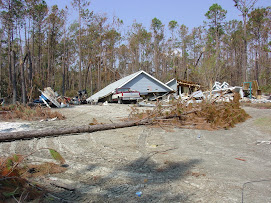Hailed in some circles as a major victory for insurers, the jury has spoken and awarded David and Marilyn Aiken $64,000 in their suit against USAA. We certainly respect the jury verdict and will no doubt find irony in the praise accorded our gulf coast based jury by some who previously had written us off as incapable of fairly dispensing justice. That praise will last until Nguyen v State Farm begins next month, but that is a different case with different fact patterns. A tip of the hat also to David Rossmiller for his analysis of the verdict though I would add the "jury pummeling" of Allstate in Weiss was deserved despite Mr. Rossmiller's earlier protestations to the contrary. As I mentioned yesterday the fact the Aiken's received anything from the jury indicates they felt USAA was not monetarily fair in how this claim was adjusted.
In any event here is the story in today's Sun Herald on the Aiken verdict and link to the jury instructions as we close the curtain on Aiken and await Nguyen.
By ANITA LEEmailto:LEEcalee@sunherald.com
A jury in U.S. District Court awarded USAA Casualty Insurance Co. policyholders only $64,000 for wind damage to their Pass Christian vacation home, which was destroyed by Hurricane Katrina.
David W. and Marilyn M. Aiken already had received $178,205 from USAA, including loss of use, but sought total coverage for their home, boat house and contents. Full payment would have amounted to $427,087 more.
The Aikens also sought damages to punish the insurance company, claiming USAA purposely minimized their claim. But District Judge L.T. Senter Jr. did not allow the jury to consider punitive damages, ruling USAA had legitimate reasons for its decision.
The Aikens maintained a tornado destroyed their home long before Katrina's tide, covered by federal flood insurance, surged ashore. However, USAA said it covered damage that could have been caused by wind and excluded from payment any damage caused by tidal surge or by wind and tide acting together. The property was subjected to 20 feet of water, minus wave action, according to USAA's experts.
The plaintiffs argued those experts were biased, but the evidence failed to support this contention.
Senter told the eight jurors before deliberations that they should take into account the Aikens' acceptance of $278,000 in coverage from the National Flood Insurance Program, which indicates they acknowledged some damage from the tide. The jury also had to consider the previous USAA payment and could not award the Aikens more than the total policy coverage.
That left the jury to consider an amount from $0 to $272,238 for structural damage and $0 to $154,849 for destruction of contents. Based on the evidence, the jury awarded $17,000 for structural damage and $47,000 for contents.
Senter also told the jury the Aikens had met their initial burden under the insurance policy of showing windstorm caused an accidental direct physical loss of their property.
USAA then had the burden to prove the portion of the loss excluded by its policy, which is storm surge or a combination of surge and wind.
Tidal surge damage is excluded from coverage, Senter instructed, "even if wind contributed to cause this flood damage." He explained to the jury: "All damage to the property that was caused by storm surge flooding is excluded even if the storm winds concurrently or in any sequence caused or contributed to this excluded storm surge flood damage."
Senter's instruction on the so-called "anti-concurrent cause" exclusion dovetailed with a recent ruling from the 5th U.S. Circuit Court of Appeals in the lawsuit Tuepker vs. State Farm, a Katrina case from the Coast. The ruling clarified when a homeowner can expect to recover wind damage. As State Farm argued, the appeals court found the wind damage must occur independently of storm surge for coverage to apply.
Tuesday, January 29, 2008
AIken v USAA: The Verdict
Posted by
Sop811
at
7:34 AM
![]()
![]()
Labels: Allstate, Insurance Law, Sop, USAA
Subscribe to:
Post Comments (Atom)

No comments:
Post a Comment